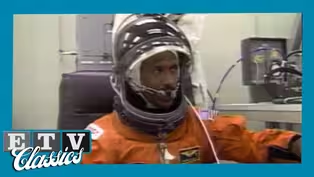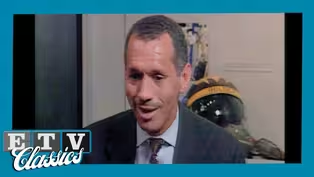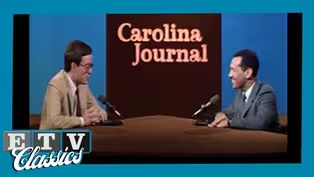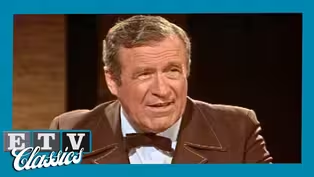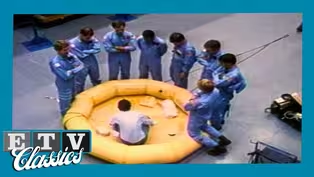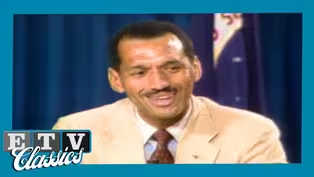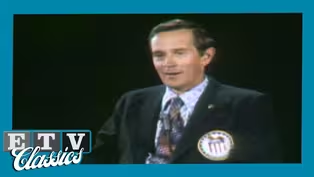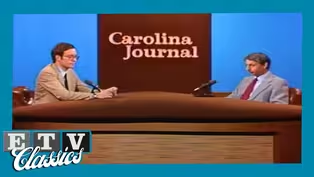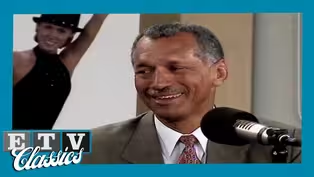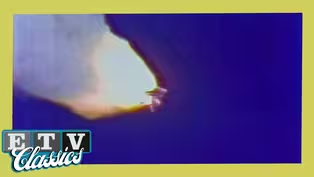ETV Classics
General Charles Duke | Open Line (1983)
Season 14 Episode 3 | 28m 50sVideo has Closed Captions
Host Tom Fowler interviews Apollo 16 astronaut Charles Duke about his career with NASA.
Apollo 16 lunar module pilot and astronaut Charles Duke explores his journey from NASA’s astronaut program to landing on the moon with host, Tom Fowler. Vivid accounts from his life provide information for even the most imaginative minds.
Problems playing video? | Closed Captioning Feedback
Problems playing video? | Closed Captioning Feedback
ETV Classics is a local public television program presented by SCETV
Support for this program is provided by The ETV Endowment of South Carolina.
ETV Classics
General Charles Duke | Open Line (1983)
Season 14 Episode 3 | 28m 50sVideo has Closed Captions
Apollo 16 lunar module pilot and astronaut Charles Duke explores his journey from NASA’s astronaut program to landing on the moon with host, Tom Fowler. Vivid accounts from his life provide information for even the most imaginative minds.
Problems playing video? | Closed Captioning Feedback
How to Watch ETV Classics
ETV Classics is available to stream on pbs.org and the free PBS App, available on iPhone, Apple TV, Android TV, Android smartphones, Amazon Fire TV, Amazon Fire Tablet, Roku, Samsung Smart TV, and Vizio.
Providing Support for PBS.org
Learn Moreabout PBS online sponsorshipMore from This Collection
South Carolina is home to astronauts Charles Duke, Ronald McNair, and Charles Bolden Jr.
South Carolina in the Space Age | Palmetto Specials (1991)
Video has Closed Captions
A look back at the experiences of Charles F. Bolden Jr. and his rise to becoming an astronaut. (18m 50s)
Conversations with Scientists and Astronauts: Charles Bolden, Part 1 (1998)
Video has Closed Captions
Learn alongside students as they ask astronaut Charles F. Bolden Jr. questions. (19m 1s)
Colonel Charles Bolden: Aftermath of the Challenger | Carolina Journal (1986)
Video has Closed Captions
Colonel Charles Bolden offers a candid reflection on the space shuttle 'Challenger' disaster. (27m 50s)
Space Shuttle: Delays & Possibilities for the Future with Dr. LeConte Cathey | Open Line (1981)
Video has Closed Captions
Dr. LeConte Cathey discusses satellites, the space shuttle, and maintaining technology for space. (28m 47s)
South Carolina Astronauts | Venture (1986)
Video has Closed Captions
Learn more about the firsthand experiences of astronauts Charles Duke and Charles Bolden Jr. (6m 51s)
Profile: Charles F. Bolden Jr. | Carolina Journal (1986)
Video has Closed Captions
A special look at the extraordinary legacy and life journey of astronaut Charles Bolden. (58m 59s)
Kennedy Space Center: Apollo 16 Launch | Nine30 (1972)
Video has Closed Captions
An in-depth look at the launch of Apollo 16 as well as the legacy of the Kennedy Space Center. (30m 6s)
Journalist in Space | Carolina Journal (1986)
Video has Closed Captions
Host Tom Fowler interviews Jack Bass, a member of NASA’s Journalist-In Space project. (27m 52s)
Brigadier General Charles Bolden Jr. | Xpress (2003)
Video has Closed Captions
An interview with former NASA administrator and astronaut Charles Bolden. (26m 45s)
Shuttle Challenger Accident | Carolina Journal (1986)
Video has Closed Captions
Host Tom Fowler brings the breaking news about the Space Shuttle Challenger to South Carolina. (29m 38s)
Providing Support for PBS.org
Learn Moreabout PBS online sponsorship♪ ♪ Tom Fowler> Good evening.
President Reagan's 1983 budget proposal to Congress includes startup funds to construct a fifth space shuttle.
This is a small part of the total cost, but it does indicate this administration's commitment to continue America's space effort.
It's a vote of confidence.
The shuttle continues over two decades of involvement with space.
In spite of the awesome abilities of the shuttle, though, the most exciting time for many people who watch the space program, once the era of America's lunar landings.
In these times of generally bad news, it's amazing to think of a time not too long ago when a president called for Americans to land on the moon, and before a decade was out, we were there.
South Carolina filmed a special part of that effort through the direct involvement of Lancaster's Charles Duke Jr. Then Colonel Duke flew on Apollo 16.
It was the next to the last lunar landing.
Now, General Duke is out of the space program, a program that involved nearly ten years of his career.
General Charles Duke, former astronaut and South Carolinian, is our guest today on this taped edition of " Open Line."
Welcome back to South Carolina.
Gen. Charles Duke> Thank you.
I'm delighted.
I'm delighted to be here.
It's great to be back home again.
Tom> Great.
I'm wondering if you can fill folks in on what you've done since leaving NASA several years ago.
Gen. Charles Duke> Well, I officially retired from NASA in December of 1975 to go into business in San Antonio.
I moved my family to a small town near San Antonio and opened a business, and for two years ran that business, which I then sold in April of 1978.
Since that time, I have been involved with another business, a real estate development business which has become less and less of my activities and more and more of my activities have been, in speaking, evangelisticy around the world.
I had a tremendous experience with the Lord in 1978.
And that changed my whole life.
And I just felt now called to go around and share the good news of Jesus with generally business and professional people in third world nations.
And so it's been an exciting time since then, and that's really been my activities the last five years.
Though I'd still have Air Force Reserve duty, and I spend about 2 to 3 months a year, working for the recruiting service as a special assistant to the commander.
Tom> Let's take a couple of minutes and let you give us just a two minute biography of Charles Duke Jr. What's the story of, an astronaut from South Carolina?
Gen. Charles Duke> Gosh, I'll try to do that in two minutes.
I was, we, my brother.
I have a twin brother.
Let me start off that way.
We were born in Charlotte, North Carolina, but my folks were actually living in South Carolina at the time.
And, we grew up in South Carolina, though during World War Two, my dad was Navy and we traveled out of the state.
But after the war, we came back to, Lancaster and settled.
My brother, is still there and my parents are still living in Lancaster.
I went to Lancaster High School, though.
I graduated from Admiral Farragut Academy in Saint Petersburg, Florida.
From there to the Naval Academy, from the Naval Academy.
I volunteered for the Air Force.
And that's how I ended up in the Air Force.
And I spent a career in the Air Force as a fighter pilot, as a test pilot, as an astronaut.
And, subsequent to that time, I resigned and then went into business and then and now, traveling for the Lord.
Tom> When you look back, now, in hindsight, as compared to yourself when you were younger, beginning your career in the Air Force, did you have any idea at that time when you were starting out in the Air Force that, you wanted to...move into the space program?
Gen. Charles Duke> None at all.
In fact, my initial recollection, was, that the space program had passed me by.
I was a young pilot at the time when during the first astronauts were picked.
And so I said, well, I just didn't have experience.
And, and I really had no desire to be an, an astronaut.
I was enjoying my fighter pilot training, career, but it just seemed like, I progressively moved to a point of being qualified.
And the NASA was, also selecting more astronauts as I came, along, in my career and my experience level increased.
And so, I ended up, in 1965, seeing an article in the front page of the Los Angeles Times It said, NASA is looking for more astronauts.
Please apply.
And about that time, I realized that, well, maybe that was a good thing for me.
And so I, I...volunteered.
I can't say I was a Buck Rogers fan when I was a kid and dreamed of going into space.
It just wasn't that way at all.
Tom> What was it that made it interesting for you?
Gen. Charles Duke> I thought, by then I was a test pilot, and I thought that being an astronaut was the best job you could have as a test pilot.
And I, it seemed like all my life, I've always wanted to have the best job that I could have, no matter what career field I was in.
And so, I, I decided that, that was the best job I could get.
And so I started pressing towards that goal.
Tom> Was there any point when you first got into the NASA program, the application process, and the first training where you might have had second thoughts about what you were doing?
Gen. Charles Duke> No, none.
I was always, from the very minute I began the application, I felt like if I got selected, this would be for me.
And I was never disappointed.
Tom> What was the path from that beginning in the program to the, to where you sat on top of the Saturn five rocket on Apollo 16?
Gen. Charles Duke>...at first it was a, initial orientation of about 4 or 5 months that they, put us through.
And then after that we were given more engineering assignments than actually flying, astronaut training type things while we were involved in some, geology training for the moon flight.
Generally we had duties that were, made us responsible for engineering systems, of the spacecraft, for instance, I was responsible for the, lunar module engines, the lunar module procedures development.
I was also involved in the emergency procedures, at Kennedy Space Center after the fire that killed the three astronauts in '67.
So those are the kind of duties I had before, I actually became a, a crew candidate.
And in '69, then I went into training after, Apollo 11, which was the first landing on the moon.
And then I was selected for a crew and then the training, the actual training then started in '69, three years after I became an astronaut.
Tom> Do you have any, any special feeling when your name was announced or when you discovered that you were on the crew and you were to be on a lunar module and land on the moon?
Gen. Charles Duke> I was speechless.
It was a total surprise to me.
I had not even heard a rumor that my name was, going to be selected as at least is best, I can recall.
And it was during a debriefing, of the Apollo 11 mission, after that debriefing was over, Deke Slayton, chief of, flight operations at NASA, said now, okay, these guys are going to be on the next cruise.
And actually, my name came out as backup crew for Apollo 13, which meant if all went well, I would fly on Apollo 16, but yet we weren't announced.
It really depended on whether we, did a good job or not in backup.
But that's the way it ended up.
I was elated.
And then I ran home and told my wife, and we wanted to shout it from the rooftops.
Yeah.
Tom> What about, later on, the Apollo 13 flight had a very close call and was...saved by the ingenuity of lots of folks, getting them back.
Briefly what happened on that, and did that change any of your thinking about...the flight?
Gen. Charles Duke> No, it didn't.
What happened, as far as the failure goes on the flight, was the, heater element in the liquid oxygen tank failed on and which meant the pressure, the oxygen was being heated up and it was turning to gas and increasing the pressure in the tank.
The relief valve performed normally, but it didn't have the capacity to vent the pressure as fast as it was building up due to the heater and eventually the tank over pressurized and exploded.
And when that did, occur, the shrapnel from that tank severed one of the plumbing lines on the other tank.
And so that tank was allowed all its oxygen, then drained, overboard or vented into space.
So they were without oxygen and command module.
I think if the flight did anything for me, it increased my confidence in the ability of NASA to respond to some major, failures and still, recover the crew intact.
Of course, the mission was a failure as far as the objectives go, but it was a success, certainly to retrieve the crew from such a disastrous situation.
Tom> What about, after that flight as you got closer to your...launch date?
Obviously, you spent hundreds and thousands of hours in simulators of, of, I guess particularly the, the, the descent to the moon surface and the terrain and, and you'll be approaching and...all of that.
What, what about those ...hours of simulation in Tom Wolfe's book "The Right Stuff," he talks a bit about, the hundreds and hundreds of hours of simulations and what that does to to make it seem just a part of you.
What what's going to happen on the flight?
Gen. Charles Duke> Well, that's exactly what it did.
It made you so familiar with the procedures and the terrain.
Because our landing model was very precise, as best they could do from the photographs we had, which turned out to be excellent.
And the simulator was so accurate, that you felt like when you got in the actual system, that you were putting on an old glove.
You know, you're putting on an old suit of clothes.
It just fit.
And in fact, the actual flight seemed to be a lot less uneventful than the simulators, because in the simulator, they were always failing the systems.
And it was like limping home on a wing and a prayer, you know?
And we'd finally stagger in to land on the moon with everything broken and in actual, actuality, the flight, though we did have some problems, one very serious problem, in general, was sort of, in, if I can use a pilot term, a piece of cake.
We just were there and we recognized our landing site.
The machine was working great.
And so when we actually touched down on the moon, we had arrived, and, six hours behind schedule, but, it was it was nothing compared to the simulator.
The simulator training, in effect, just really prepared you for the for the actual flight so that you felt right at home no matter what happened.
We were, we felt we could handle any contingency.
Tom> That's what it's all about.
I guess they just throw different problems at you so many times that that you can cope with it.
Gen. Charles Duke> It was a big game between the engineers on a computer console who were in charge of, of initializing the system and getting us in position and us inside.
They tried to make us crash.
We tried to land, you see.
So, we it was sort of a bet that they couldn't give us anything that we couldn't handle.
So it was sort of a prideful thing on both ends.
But it was a friendly competition and it, their goal was, of course to make us us... ...as proficient as we could possibly get, and ours was also to get to that point where we could handle anything that came, came at us.
Tom> That's, they're one of the popular home computer games around these days is the so-called lunar lander program, Gen. Charles Duke> I never have been able to work it.
I've crashed every time.
No survivors.
Tom> I was going to ask you that.
Yeah.
You blasted a crater 400 feet wide.
Gen. Charles Duke> That's right.
And that, the forerunner of that game we had ten, 11 years ago on some of the NASA computers, the little, mini ones.
And nobody ever, ever made it.
I could do it in the lunar module, but when I got on that game, I couldn't, I have never been able to do it.
Tom> Did you have any special feeling when you, you kicked loose of the command module in orbit and began your descent?
Was or was it, you know, so much a part of you as you were talking about that it was just, you know, second nature?
Gen. Charles Duke> Now, I don't mean to say we were robots.
I mean to say we were familiar with it, but the...emotional experience, of course, cannot be duplicated in the simulator.
So, the emotional high and the excitement was, was just step by step increase.
And when we, we're in orbit around the moon and separated from our command module, we were elated because we were.
I forgot exactly what I said, something like we were floating free and we were ready to go.
And about that time, the problem started developing.
So we really didn't have a chance to, you know, just be in euphoria.
We had to really get to work and overcome these problems, which, with the help of a great team in Houston, we were able to do.
And so we were able to land one time during our flight, the situation looked fairly serious.
Mattingly, his spacecraft had a problem with its main engine control system, which, we initially thought was, would require an abort.
In other words, we weren't going to get to land.
So emotionally, we were really down in the pits.
And if your heart can drop in zero gravity, ours felt like it was down and our soles of our shoes, because we had trained three years, we'd come 240,000 miles.
We were within eight miles of the landing site.
We could look down and see it.
It's every time we came around and we were in the process of joining up again, getting ready to come home.
So we were very low.
And when Houston gave us the go for landing, we couldn't believe it actually.
And so we, spirits came back up again.
And then from then on it was just a high.
Tom> What about the last few seconds before you touched down when you just before you cut the engines off and you cut the engines off and touched?
Gen. Charles Duke> Well- Tom> What are those sensations?
Gen. Charles Duke> ...the last few, the last 30 seconds, for instance, I knew we had it made, John...had selected a very good landing site.
As near as we could tell, it was almost perfectly level.
We were, had plenty of fuel, and John was, we were coming right down according to plan, but at about 20 feet, for some reason, he leveled off and stopped his descent about 20 feet above the surface.
And by then the rocket engine was blasting out the dust, and it became like you was starting to look through the fog at the surface.
And then I started getting a little anxious because we were just hovering and the fuel was rapidly going down.
And I kept exhorting John to let her on down, let her on down.
And then he finally started down, and it took about another 20 seconds for us to get down to touch down.
But we ended up landing with ample fuel, and everything else was, all the other systems were go, but when you're that close, you sort of get a little anxious when you're sitting there just hovering.
So I guess I got Tom> What was he doing?
Gen. Charles Duke> Oh, he was cool as stone.
He was unflappable.
He had, was making sure the landing was right.
And, and he had all of these residual velocities null to zero so that we would come straight down, though the lunar module could land with a, a sideward or a forward velocity.
Generally, we tried to hit going straight down.
And so he was making sure all of these residual velocities were all that.
And I was helping him with that.
That was really my job.
Tom> We've got some pictures of the walk on the moon at various points.
And let's take a look at look at that.
Okay.
I need you to talk a bit about what we're seeing.
Gen. Charles Duke> This is a, television video that was made into a movie.
Of course, it, because there wasn't anybody up there taking our picture but the television camera.
I'm on the right, and John's on the left, and we're coming down a fairly steep slope.
We had climbed in our lunar rover up about 400 feet above the valley where we had landed here again.
It's in a in a small depression, a crater.
We, you'll notice that the surface of the moon is sort of a gray, dusty color and very dusty due to the crushed rock.
We started out looking like Mr. Clean.
But within a few hours the dust, got on our suits and ended up we were gray color.
This gives a good view of the lunar module as we've completed one of our, EVAs or Moonwalks.
The vehicle, the lunar module was about 22 feet high and about 22 feet wide.
So it gives you a good idea of, of the size of it here, as we stand next to it.
The television camera now is zero... zooming in on me as we prepare now for another excursion.
The lunar module is in the background.
The little sack I have in my hand is a lunar collection bag, which was useful for, putting our samples in.
This is the last stop we made after we had been on the moon for 30, 72 hours.
That I'm on the right there and that black spot above my head is about 500 yards away, and there's a large crater between me in that spot that's about 200 feet deep.
And it was so steep we couldn't see the bottom.
This is just a large rock on the side of that crater we thought was going to be the biggest rock that we, visited.
It turned out it was, a small pebble compared to this next one that you'll see here.
We're jogging off now towards that rock, that black one in the foreground there.
On the moon, you have a problem with distances because there are no familiar objects, Tom.
You can't, look out and say, well, that's a block away or 100 yards because you've never seen these objects before, so you have no idea whether it's a large object far away or a small object close in.
Well, as we started jogging away, you'll notice in the, in the film here that the rock grows in size as we jog into the, into the distance there.
And it ended up when we got down next to that rock.
It was about 30 feet tall and about 90 feet long and was larger than a house, actually, and we were overwhelmed with the enormous size of it.
And as I stood next to that rock with this little hammer in my hand, wondering what I was going to do to collect a sample.
But as we went around to the right side of it, there was an outcrop of the rock that allowed me to pound on it with, with my hammer and collect a piece about the size of a grapefruit.
This was the largest single object that anybody saw on all of the Apollos.
Now, this is the, final parking of the lunar rover.
We left the television camera activated, and we jogged around to the front of the lunar module for, "Get ready for liftoff."
And here we go back into space again after a three day stay on the moon.
Into the blackness of space.
Six minutes later, we were in orbit, going about 3000 miles per hour, above the moon and an hour later, here we are.
Now, Ken Mattingly is taking our picture from his spaceship as we orbit the moon 60 miles above.
Tom> And we're out of it right now.
That was, I'm sure a lot of folks, didn't quite remember.
And when I see that picture of the, of the launch that the camera was active on that lunar rover.
Gen. Charles Duke> That's right.
Tom> But that that's a, one of the more tremendous shots of the entire.
Gen. Charles Duke> I believe that was the best one that was, taken during the entire the last three flights where we had a camera that could be controlled from, from Houston.
It had a pan and a zoom in elevation.
So they did all of it there.
All we had to do was turn it on, and then they took control.
So it left us free to explore.
It was spectacular.
Tom> How long were you on surface?
Gen. Charles Duke> Almost 72 hours, a little over 71 hours.
And we were planned 72 and we almost made it.
Tom> Did you get any sleep?
Gen. Charles Duke> Yes we did.
John and I were allowed to sleep during three separate occasions.
The first occasion we didn't get much sleep because, it was just a few hours after we landed on the moon and we were so excited.
We were like two little kids at Christmas.
That, it was sleep was very difficult in coming.
But after that, we were very tired.
Working on the moon is hard job.
And, so we were thankful for the sleep periods.
Tom> How much difficulty was it, getting in and out of the, the.
Did you get in and out of the suits?
Gen. Charles Duke> Yes we did.
After every excursion, we climbed back in.
We took off our backpacks, took off our, which were our life support systems.
We took off our suits and the lunar module.
That made it very crowded because it was difficult enough with two people when you took the suits off and basically you had four people in there because the suits were bigger than you were.
And so it got very crowded and you had to be a good housekeeper, to make sure everything was put in its proper place.
Then we were able to sleep, and I really I set a long underwear, in a hammock.
Then the next day, we'd get up, we eat a meal, put on our suits, pressurize, depressurize in the lunar module and climb outside for another excursion.
Tom> We saw the lunar rover in a couple of the pictures.
And that's something that, again, you have to think back to remember that.
But, sort of a dune buggy on the moon, it was called.
Gen. Charles Duke> Exactly.
Yes.
It was an electric car, had four wheel drive.
And, it was, designed to be steered from either seat, though.
John Young in the left seat was the main, was the driver.
I was more the navigator.
And it had a, handle that was, total control, if you will.
When you push the handle forward, you accelerated.
When you pull back, you braked.
And when you pull the handle, to the side, it would turn in the direction you pulled.
And so it was a very maneuverable machine.
Tom> When you...think of those hours on the moon, you spoken of, of your religious experience.
in 1978, Did you have any, any religious sensation or inspiration while you were on the moon or during the flight to the moon or back to Earth?
Gen. Charles Duke> No, I didn't, I did not have a spiritual experience in space.
I was not looking for God.
I didn't think that, really believe that God was real.
I believe there are two, two responses you can have from a trip like that.
One is that the pride of life and the pride that is in us all wells up and it's, man, look what we have done and look what I'm accomplishing.
And unfortunately, that's the way I came back.
More of a humanist, man can do it all.
The other response is, like the psalmist says in Psalm 19, "The heavens declare the glory of God.
"The skies proclaim the works of his hands."
I wish I had had an experience, with the Lord up there, but I didn't, as I said, I wasn't looking for that kind of experience.
But lately, five years ago, I did.
And I realize now you don't have to go to the moon.
Go to the moon to find to have a relationship with the Lord.
Tom> About the space program.
Do you miss it?
Gen. Charles Duke> Only when I see my friend sitting up on top of the, shuttle ready to lift off, then I get very nostalgic and wish that, at times that I was there.
I'm...
I'm very content, though, in my in my present life.
In fact, as an ambassador for the Lord, I travel all over the world.
And I've never known such a life of peace.
It's, it's a real, fullness now that I have in my life because it's balanced.
And so I really don't miss that.
That, that life that I had, except, at the moments of the excitement of flight.
And that still is there.
Tom> We have about two minutes left.
The shuttle program is continuing its, it's strengthening its foothold.
in... America's space program and beginning to strengthen a foothold in commercial aspects.
Looking beyond that, Americans now, in our, our movies, we're obsessed with space in a lot of different movies, the video games and all of that, that young kids are playing.
Many of them are aggressive games, but many of them are space oriented.
Does this, does any of this point toward anything in the future as far as where you think we're...heading beyond the shuttle program?
Gen. Charles Duke> That's hard to say.
I don't think that, that our fascination with space will result in, in a, in trips to Mars, for instance.
I believe we can do that unmanned.
I used to believe that we should go to Mars manned.
I'm not so sure of that anymore.
I believe the decision to expand the space shuttle to utilize near space for the benefit of man is the correct decision.
And that, we will, see, a decade or more of of activity in near space, manned flight, probably going into space station development before we'll see another venture out into deep space, into the moon.
I don't believe that, ...there is the impetus in the decision processes now, of our country and our government to to commit to a manned flight to Mars, for instance, I believe we are on the right track right now with space shuttle, and we'll see more and more of that.
Tom> Okay.
That's all the time we have.
And our thanks to Charles Duke, Jr. astronaut in Lancaster, South Carolina.
Good luck to you.
Gen. Charles Duke> Thank you.
Tom> Thank you for watching.
Good night.
♪ ♪
Support for PBS provided by:
ETV Classics is a local public television program presented by SCETV
Support for this program is provided by The ETV Endowment of South Carolina.
